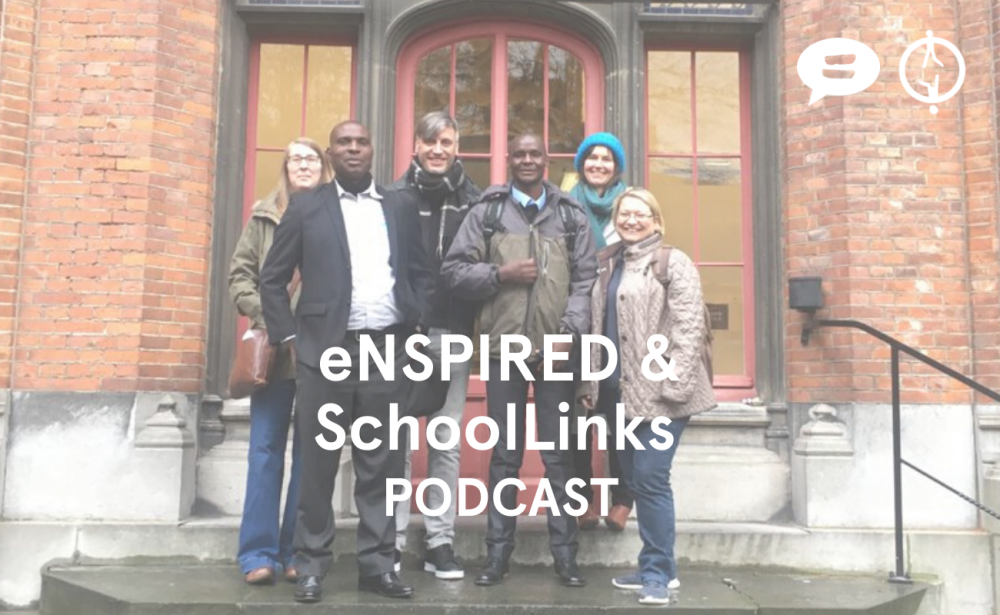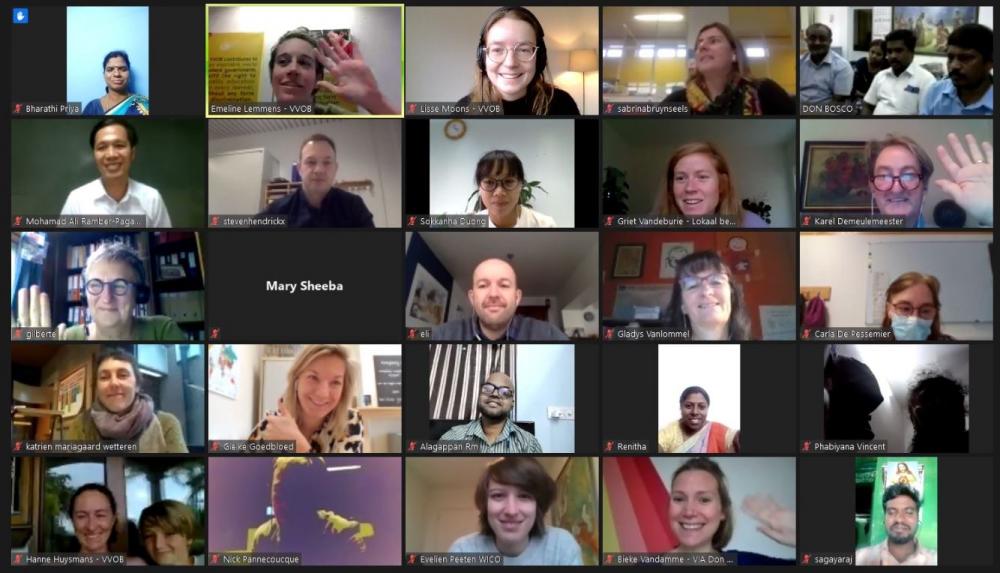On Wednesday 23 March 2022, we gathered for an online inspiration session. Sebastian Van Hoeck from UCOS provided an introduction to decolonisation. What does decolonisation mean for international partnerships? How do you start? How equal is a school link? What prejudices do you have? What is anti-racism? In other words, he gave us a lot of food for thought.
Sebastian Van Hoeck (UCOS) is an environmental scientist by degree and holds an additional advanced master in Globalisation and Development. He has lived various years abroad, including South Africa, Cuba & Nicaragua and worked for the Belgian development cooperation in Tanzania. For the past 4 years he has been an intercultural trainer at UCOS, focussing on ethical North-South partnerships, decolonisation, global citizenship and anti-racism.
The 'Global South' and colonisation vs coloniality
When we talk about international partnerships, we often refer to 'the Global South'. According to the classical and economic point of view, these are countries close to the southern hemisphere that have high levels of poverty and misery and high levels of income inequality. From the decolonial point of view, these are countries that have a history of colonisation, oppression, exploitation and violence, and which still bear the economic and social consequences today.
There is also a difference between colonisation and coloniality. For example, colonisation is a clear period in our history defined by the settlements, the exploitation, and the abuse of the colonisers towards those who were colonised. In addition, you have 'coloniality' which refers to the power structures that still exist today that maintain colonial relations based on the superiority of the West and the inferiority of the countries beyond the borders of Europe and the United States.
Eight principles of decolonisation
Principle 1: Active anti-racism
It is impossible to be decolonial if one does not pursue anti-racism actively.
Principle 2: Development for whom?
One must be very critical within the decolonial spirit about development, and the question of whom development is for, what the aim is, and how we define development.
Development is not something that is brought on to people, but development is a set of conditions created to increase the agency, the movement of freedom of other individuals and groups for them to decide upon their own development.
Principle 3: From aid to fair cooperation
If we pretend to be equal in an unequal world, we will most undoubtedly achieve unequal outcomes. So, when one talks about decoloniality, one must explicitly recognise the differences in privileges, resources, finances in time, education etc. If we really want to be decolonial, we need to move to equal partnerships but recognise that partnerships are not equal in the first place.
Principle 4: Long-term approach and network
If we really want to be decolonial, then it really is important that we stick together for a long time. If we want to move towards a world of eradicating all these injustices, then we must be able to learn from each other, be loyal and say, ‘I will stick with you in this broad partnership.’ So, no ‘fly-in, fly-out' development.
Principle 5: Owernship
Who decides what and for whom?
When we talk about equality, it is important for those within a partnership that are most vulnerable, that they should have the right to decide what the partnership is about, and not those that are most powerful.
Principle 6: Knowledge production
We must question whose knowledge we value. We very often define knowledge as western, Eurocentric, academic, scientific etc. This often means knowledge only comes forth from general white people, and even more specifically white males.
Consider when we talk about decolonisation: other than the dominant forms of knowledge we don’t use: oral tradition, cultural practices, etc. There is so much knowledge that is not valued.
Principle 7: Language and representation
Words become worlds, so we need to be critical about the words that we use.
There is a tendency to present the Global South in quite stereotypical images of poverty. Ask everybody in the partnership: how would you like to be represented, what do you think is a good picture of you, of your school, of your community? This way we can move away from these enormous stereotypes of poverty.
Principle 8: Critical training
We must talk about critical global citizenship, we must talk about racism, we must talk about the history of development, cooperation etc.
Critical training on these important topics should be provided for everyone within such partnerships, and Global South partners should have strong ownership over this critical training. Namely, it should be up to Global South partners to jointly decide what is included in such training.
Anti-racism
When we talk about racism, we tend to focus on racism from an individual perspective. But racism is not about the individual, but about the collective. It is not about somebody intentionally excluding or discriminating somebody else, but invisible, unconsciously, based on prejudices that are often deeply rooted in colonial history.
People of non-white skin colour experience structural, important, significant disadvantages in their livelihoods: Some examples from research:
- Work: within the European context, if your name sounds foreign, it is much more difficult to find work.
- Housing & social benefits: within the Belgian context, if your name sounds foreign, it is much more difficult to rent a home or to be eligible for social benefits.
- Police & justice system: within the US context, If you are not white, you have a higher chance of being arrested and stopped by the cops.
- Health care: when a black female in the US asks for medical help, she has a much longer waiting period compared to a white woman.
These structural, institutional forms of racism are unconscious and deeply embedded within our different social domains.
We must understand that this institutional, structural racism is an ideology and served a function. The function is to have a policy that works better for white people than for everybody else in this world. It’s not there just simply because it is natural, part of a hierarchy or part of human tendency; that is the big misunderstanding.
A few questions for you to think about:
- Are you willing to acknowledge your own prejudices?
- Does reverse racism (racism towards white people) exist?
- Do you think there’s something wrong with the statemen ‘I don’t see colour, I treat everyone equally’?
If you have any questions about this or would like to know more, you can always contact us at info@scholenbanden.be.



